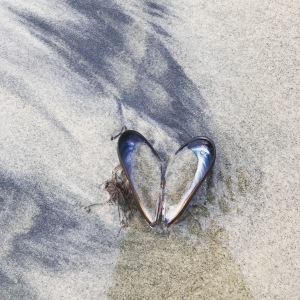 Something About the Romans
Something About the Romans
By Evan Massey
On the porch, the radio plays old tunes. Sometimes our heads bob. I’m on the top step. Below me, Bianca sits behind my little sister, Tia, braiding her hair. She combs out Tia’s rough hair with an orange comb, applies grease. Bianca doesn’t have rough hair, no. She has good hair. Tia doesn’t care much for Bianca because of that. It’s a girl thing, I guess.
My mama used to do Tia’s hair. She was gentler with that orange comb. She’d even cut my hair when it got too long. Boys shouldn’t have long hair, she’d say. But I loved it when she’d cut it. We’d talk about life, me becoming a man, and sometimes about my father. Her gentle hands would glide the clippers through my hair, trimming it to her liking. I would feel like a new me afterwards. But now my hair’s the longest it’s ever been. It gets longer by the day, it seems.
It’s hot out, even hotter with this long hair. Inside’s no better. The Mississippi sun tans us, sweat beads dot our black skin. I hold a cup of lemonade to my forehead, then take a swallow, ice cubes kiss my lips. It’s more sugar than lemon—Bianca’s doing. I watch her jerk Tia’s head with that orange comb again, smearing more grease. The comb works through the hair. The sweet, greasy fragrance sweeps across my nose.
Bianca is our half-sister. She’s about ten years older than me, fifteen for Tia. She’s light-skinned, curvy, and has good hair that hangs past her neck. She doesn’t look like us. Not at all. She moved here from her father’s house some years ago. Her and Mama sat at the kitchen table when I first saw her. I heard Mama say, “Things will be all right, child. No need to worry.” When Mama saw me standing there, she stopped talking, smiled. Bianca didn’t say much back then. Mama said I had to give up my room to her and sleep on the couch.
“Ya’ll need to start listenin’ to me, now,” Bianca says to us. She finishes a messy braid.
Tia whispers something under her breath. Bianca goes on about how she’s the oldest and how we need to show respect. I tune her out with the radio.
Across the street the Whitfields wave at us. We wave back. They’re an older couple. Mrs. Whitfield brings food over every so often. I’m thankful for that—Bianca isn’t the best cook. The Whitfields knew my grandpa. He’d race down at the drag track. They said he could beat anyone. People would come from miles away to race him and lose, Mr. Whitfield told me. Grandpa’s Chevelle is in our yard, tires and wheels gone, grass grown tall around it. People made offers, but it wasn’t for sale.
In the drive, Mama’s Buick sits. The tires are nearly flat. I need to fill them and give the car a wash. We used to go riding in that Buick—Mama, Tia, and me, before Bianca entered the picture. Mama would put the windows down when we went on long drives. I’d put my hand out and try to catch air or feel the air move between my fingers. She’d point at fields where she said generations of our family worked from morning to night. Hard work, she said. I’d look at all that land. My mind would try to go places. Places far away from here.
A car stops in front of our house, blasting music. It’s an older boy I know, David, but he wants to go by Dee. He calls out to Bianca. She ignores him. He calls out to me to go riding. A few days ago I went riding—something I regret, something Mama wouldn’t like. We fought with some boys from the town over. Dee had words with them. Then punches were thrown. I still have the cut above my eye, marks on my hands. I shake my head at Dee. He turns up his music, speeds off. I sip sugary lemonade. Then I look past the Whitfields’ house at the big trees and the big field back there that goes on forever.
Bianca finishes Tia’s hair, they go inside. I turn off the radio then see a dog walking across yards. It’s a thin, beige dog. Every now and then it came around for food. It stops in our yard, looks up, wagging its tail. I go get our last can of tuna, then come back. I put the can at its feet. The dog works that can of tuna, licks its mouth when it finishes. It looks at me, wanting more.
That’s it, I say. Its head lowers, moves on. People yell at it from their porches. The dog runs away.
Inside, Bianca microwaves leftovers. Tia picks at her food. I don’t eat and Bianca asks me what’s wrong. Nothing, I say. But there is something, I feel that she knows. I put my hand on my head, running my fingers through my thick hair. Then I make for the bathroom. On the way, I pass piles of Mama’s boxes and clothes, stacked high. There are more boxes to fill. Bianca keeps telling me to get rid of things. It’s not that simple.
In the bathroom I stand in front of the dirty mirror. I click on the clippers and consider my thick, long hair. Then for some reason, I think of something. Something I heard the few times I was awake in class. Something about the Romans. Our history teacher once said that the Romans would grow their hair during times of mourning, or something like that. I think about how life was in those times, how things change. But the thought is brief. The clippers hum loud in my hand as it quivers. But I go for it, I do it. I cut from front to back—like Mama always did—gentle and slow, watching hair fall like black rain.
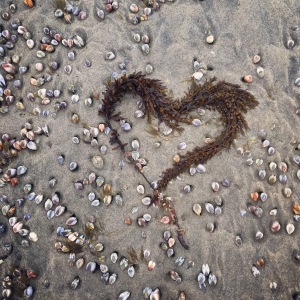 MAJORCA
MAJORCA
By Salvatore Difalco
The scene that unfolded in the humble bodega that evening attacked the ramparts of my rationality. An objective outsider or a Spanish fly attached to the wall—possessed of a discerning consciousness—might have attributed my point of view to the half-filled bottle of Licor de Orujo, a pomace brandy obtained from the distillation of marc, 100 proof. But I had been in Majorca long enough to know that what I saw in the sun-baked resonances of dusk, in the deformation of lines, and the exaggeration of physiques, had more to do with passion than optics.
A gaunt young man in a scarlet blazer, gold buttons dotting him breast to crotch, stood before a woman in an orange blouse. Her blouse fluttered as he shouted:
“¿Que demonios estás mirando?”
“Te ves como un loro,” she replied.
After a month in Majorca I knew the word for parrot.
“¿Un loro?” he sputtered, galled. “Eres una cretina!”
The woman smiled thinly and said, “Espera aquí un momento.”
She retreated to the back, where long black curtains had been hung to block flies. The flies were fantastic in Spain, obdurate, atonal. After a month in Majorca I came to understand them.
The woman went through the curtains. The gaunt young man stood there, anguished, impassioned, his dark eyes darting hither and thither. I averted the forlorn gaze of those eyes. At times the search for ultimates in sensation and feeling cannot be chained to traditional frameworks.
The young man turned on the spot in the middle of the bodega, straining, suffering, teeth locked in grimace. It was a face I shall never forget.
The woman returned moments later with a Mason jar. Something red and fleshy jiggled in the jar.
“Estoy devolviendo tu corazón,” she said.
Even in my semi-delirium I understood the implications of tu corazón. She was returning it? In a Mason jar? I shook my head violently. Sometimes this helps. Other times it worsens things. It’s polarizing.
The young man took the rejection hard. He fell to his knees and wept, hands clasped as if in supplication. The woman’s orange blouse darkened as the sun fully set and the light shining through the windows dimmed to a brown blush.
With the flies humming their last hurrahs before nightfall, she thrust the jar at the gaunt young man, and he took it. Then she turned around and disappeared through the black curtains again. He knelt there, holding the Mason jar. I wondered what came next.
The debris of the artist’s solitude accumulates in unlit corners. The need to shine a light, sweep it up and dump it in the trash does not supersede the thrill found in stripping bare the truth. If I told you the young man took the Mason jar and hurled it against a bodega wall adorned with a bull horns and an old guitar, I would be propagating fiction. If I told you the young man offered me the Mason jar for the rest of my Licor de Orujo, I would say it makes a good story.
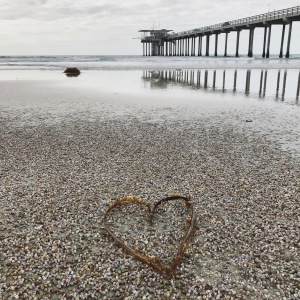 Counting Backwards
Counting Backwards
By Cinthia Ritchie
My fifth lie
My husband’s hands touch me the way they touch a magazine or newspaper. I crumble the pages and tuck them beneath the cat box.
“Come to bed,” he says. He pats the pillow, the way they do on sitcoms.
I flush the toilet, pretend to wash my face. I don’t brush my teeth.
He’s sky and I’m earth. We stutter like jigsaw pieces that don’t fit. After he finishes he pats my back. His palms sweat.
“Love you,” he says. What he means is: Will you turn out the lights and let out the dog?
I leave on all the lights, sit in the kitchen and feed cold pasta to the dog.
My fourth failing
Afternoons the sky washes a pale shade, the color of the blouse my mother bought when I was in tenth grade. She said it matched my eyes. My eyes are brown. After school I stuffed it in the trash can at the Pizza Hut, walked home in just my bra.
Now I wear push-up bras. I buy these at the Gap, pay too much for too little material. I wear these for my lover, who has a scar across his foot. I adore his toes, which are square and competent. I hold them in my hands as he sleeps, tenderly, the way I imagine I’ll one day hold a baby. “There, there,” I whisper to his sleeping feet. His ankles look helpless and lonely. I return home reeking of sex. The dog growls when I walk in but my husband ignores me.
“We’re out of cheese,” he says. He’s clipping coupons from the newspaper.
I don’t like milk but sometimes, in penance, I cook grilled cheese sandwiches.
My third lie
In the afternoons I shop at the Target. I buy things with my husband’s money, cough drops, socks. Halfway home I remember that I forgot cat food. I stop at the Safeway, pick up a steak. I’m frying this when my husband walks in.
“Smells good,” he says.
We eat the steak with salad and rice. The cat gnaws the fat beneath the table. I save the bones for the dog. My husband escapes to the office and I watch TV with the animals, stroke the black cat’s tail. I don’t know why I got married.
“It’s not my fault,” my husband shouts. “You’ll never be happy.”
It’s not his fault. I’ll never be happy.
After he falls asleep I creep in the bedroom, keep to my side of the bed. My hand wanders inside my underpants. I think of my lover, his salty, pungent breath.
“You crying?” My husband asks.
I get out of bed, eat a bowl of peaches. Insomnia is a curse, my grandmother used to say. I sit by the window, the night deepening, the dog sighing.
I’m happiest at night, when no one else is awake.
My second sin
I go to church most weeks. I don’t believe but I’m afraid to not believe. I carry a rosary in my purse, slippery beads flowing my fingers. Church is sensual but everyone pretends it’s not, prayers between our lips and Christ without his shirt. “Blessed are those who come in the name of the Lord,” I sing. Incense weakening my head, the bitter thump of my heart. I don’t believe but I want to believe. The communion wafer makes me hunger for donuts, the cheap kind with a lot of grease, cream spilling my tongue.
“The Body of Christ.”
“Amen,” I whisper.
Once, I stole a quarter from the collection basket when I was young, slid it inside my underpants, those days of the week panties we wore back then. Later, in the bedroom I shared with my sister, I pressed it between my legs, rubbed it back and forth, colors flitting my eyelids.
I told this to my lover.
“We were Baptist,” he slips his hand inside my underpants and cups me with his fingers. “The sermons were rigorous.”
Rigorous: The things I do with my lover, the way our bodies twist, the things we promise, swear, beg. It’s not love, we both know this. Outside of the bedroom our words lag. Without our bodies, we are bereft of language.
“Language is inadequate,” I say.
He nods but knows I’m lying. Language is everything, and nothing. We erase each other’s word. Our tongues are sly, but useless.
My first truth
I’m not really married. I don’t have a lover or even a dog or cat. I’m not really alive, I’m a fictional character.
When I was eight, I fell in love with Jim from Trixie Belden. I didn’t understand that he wasn’t alive, that he didn’t really exist. He was in the pages of one of my older sister’s books so therefore he was real.
Years later, I ran barefoot through tall mountain grass and another time I kissed the red, chalky cliffs down in Oak Creek Canyon. My tongue on rock—it was one of the most romantic moments of my life.
Now I am older, my body aging. I touch myself too much, not in pleasure as much as familiarity, my fingers coated with my scent. I lay them across my chest, an offering, an altar of skin, and bones.
 Berries and Cough Drops
Berries and Cough Drops
By Kara Bernard
Stop.
Stop.
STOP.
The red hand glows and screams in my face as a car blows past, its horn blaring in my ears. I trip over my feet as I stumble back onto the curb. I wait. I breathe hard.
The hand dissolves into white.
I cross and work myself back into a run.
The hot pavement makes waves in my vision. The trees and light poles melt into a rippling dance as I approach them. Their instability makes me nervous. I look at something else. Birds. Powerlines. Dog shit. Honda. Taco Mac.
I pass enclosed playgrounds built on land dedicated to statues and history. A man on a horse, rearing. A group of children, pigtails frozen in flight. A straight-back general, mustachioed. All bronze. All still. All stuck.
A dog barks at me from the other side of the fence. I’ve heard they can sense your stress, like horses. Elizabeth told me that once. About horses. She knows about stuff like that. I remember her lying on my chest when she told me. She smelled like coconut oil and cough drops. Her hands were cold on my stomach. They were always cold on my stomach.
My throat tightens.
I run harder, and the shadows from the trees overhead flicker on and off and on and off as the clouds pass. It’s making me nauseous. Lightheaded. Faint. Oh no, not again. My chest is tight. I can’t breathe. I suck at the air. I clutch at my chest. I can’t breathe.
Breathe.
But I can’t breathe!
Breathe.
But I can’t.
I force myself forward. Just get to the bench at the corner. You’ll be fine if you can just get to the bench at the corner. Fifty more steps. Thirty-eight. Inhale. Seventeen. Slow breaths. Nine. Exhale. Two.
I collapse onto the bench. I clench the seat of it and feel the embossed markings on the wood digging into my palm. In Memory of Shelby Richardson, Beloved.
I shut my eyes.
I am loved. I am wanted. I am calm.
I repeat my mantras. I rub at the empty spot on my finger with my thumb, trying to erase the tan line encasing it. I tense up. I choke.
I fucked her. I fucked her. I fucked her. I’m crying. I’m sorry. I fucked her. Oh God.
The bench heaves in time with my shoulders. I can’t believe I let this happen. I can’t believe I lost control. I should have had more control. But she looked so good sitting all alone at that bar. She looked like romance, and she smelled like berries. She didn’t smell like cough drops. She smelled so good. She felt so good. Elizabeth feels like metal. She tastes like steel. She doesn’t smell like berries.
But she smells like twenty years. Like fried eggs, extra pepper. Like stray possums in the garage in December. Like lake air flowing over tandem kayaks. Like fireplaces and mortgage bills and late nights and home. Oh, God.
What have I done?
What have I done?
What have I done?
 THE TIKI CABANA
THE TIKI CABANA
By Minyoung Lee
It is lying there on the white beaten sand amongst the seashells and crab pieces. I pick it up. It looks fresh, full of crimson ink, and smells of seaweed. I wonder if it works.
I walk over to this beach cabana bar nearby, where the drinks are nothing but sugar and ice. I know I can try it there, undisturbed. The missus and I used to drop by there on Sundays. She liked picking apart the cheap Chinese umbrellas that came with the drinks, so the bar couldn’t reuse them with the next customer.
I ask the girl at the bar for a lot of napkins and the special Margarita. They expect the older gentlemen to pay more, since they are rich enough to retire when the locals cannot. The special Margarita is a few bucks extra and supposedly much stronger. It never seems to work.
It was the missus’ idea to move here. She loved the friendly people who celebrated payday at Walmart, the salty breeze that slowed you down. I had wanted to go to Arizona. The ocean scared me with its green waves, both clear and muddy. The desert was brightly lit and had nothing to hide. But for once, I thought she should choose where we live.
I press the top of the pen, letting off the pressure with a crisp click. The tip looks clean, as if it had just fallen in the sand when I walked by to pick it up. I start by drawing spirals on the edge of the napkin. After the third squiggle, the pen lets loose, spilling a stream of smooth, red ink. I color in the shapes made by the spirals overlapping one another, filling out the entire corner with splotchy red hues. I continue until I fill the entire side of the napkin. It blushes my fingertips when I pick it up. Somehow it does not leave a mark on the wooden table.
The mark the missus left on the crosswalk lingered for a few days until it was finally washed away by the winter storms. She barely had time to enjoy the Gulf Coast before she passed. She loved going on those walks at dusk, enjoying the leftover sun. I told her to stay home that night. The road was busy and covered in fog. Those rusty Silverados loved speeding in the dark even after their drivers had a few beers with the boys. But she wanted to keep active to enjoy a long, healthy life.
I finish my drink and the girl replaces it with another. I pick up a napkin and start again, drawing little tornado shapes that overlap into tiny crescent moons. I color them in again because the empty spaces bother me. I remind myself I should sell our home and find a place where all the rooms are used.
The missus was a wonderful artist. She could have gone pro had it not been for life. She wanted to sell her art at the Saturday farmers market, but promptly gave up after a few visits to scope out the competition. Instead she stacked her paintings in the garage, letting them freeze and thaw as Midwestern winters came and went. Now those canvases were set to mold in the heavy, mosquito-laden air.
Empty glasses pile up, as with napkin after napkin. The pen runs out of ink, its tip tearing apart the fragile paper. I see the wooden table underneath the tear, like the mark she left on the concrete pavement, turkey buzzards waiting to pick at her head. They lie there, still, all six napkins soaked in red ink, ready to be picked up by an overworked ambulance. I watch it as we used to watch jellyfish at the pier, floating in the water, wondering whether they were dead or standing still. I watch as the jellyfish start to ripple, turning the entire bar into a wave of blotchy red napkins.
I envision myself on a boat made of a Chinese umbrella, floating amongst the pile of napkins. I fish out the jellyfish, trying to rescue them on my boat. They keep hopping back into the water. The scribbles all around me suck them in, a whirlpool headed to the sea bed. I do not want to be on the boat by myself, floating in a sea of torn red napkins. I wish she was here to tell me what to do. I think she would want me to steer straight towards the beach. I want to tell her I don’t know how.
I swirl in the pen ink scribbles surrounded by sinking jellyfish. I wonder where the jellyfish go once they hit the seafloor. I wonder if they would be enjoying sugary drinks with us had we waited a few more years until becoming full-time snowbirds. I wonder why she didn’t stay home that Friday night. I wonder if I should have insisted on moving to Arizona. I wonder if I could join them on the seafloor, the jellyfish and the spirals and my little umbrella boat.
But I know the jellyfish don’t care. The turkey buzzards don’t care. The Chinese umbrellas don’t care. And the empty pen doesn’t care. I slide it over the edge of the table, letting it hit the tiled floor. It clatters for a few seconds. Then it stops.
I am in this beach cabana bar alone.
 I Knew Everything, I Knew Nothing
I Knew Everything, I Knew Nothing
By AN Block
“What the hell is this?” I said, staring in the mirror, bursting the pimple.
It was indeed subtle, the way the fat started melting away. Nobody noticed. Then, I began utilizing three-syllable words where one or two syllables would do, and that drew attention. I knew everything, I knew nothing, and whenever the old Stars and Stripes rippled into view I’d get a shivery chill. Long buried names returned with sonorous clarity. Batting averages.
Was the condition reversible?
“You’ve been curiously silent thus far,” Bennett said, addressing me at Book Group. “What’s your take, Sonny?”
I rolled my eyes and let an old familiar lamentation rise from the back of my throat. “Sonny is hardly an acceptable name. Let’s all use Alfred, shall we?” Then, I paused. “The book was a frightful bore. That’s why I’ve been curiously silent. Thus far.”
Eyebrows rose, heads turned to Eleanor, who had selected our monthly reading, The Man Without Qualities.
“Well,” she said, “to each his own, I suppose. Did you not accept the premise?”
“I mean, I don’t know,” I said, unwrapping a smooshed Devil Dog I had been hoarding in a pocket. “It just kind of sucked.” I licked the cream out.
“Ah, but let me read the central passage,” Bennett said, adjusting his bifocals. “The key to the book.”
I tugged my wife’s sleeve. “Can I be excused?”
“May I,” she whispered, between her teeth.
“Your behavior,” she said, after everyone thankfully went home, “oh, my God! I mean, in thirty-one years of marriage,” she continued, before I interrupted.
“Behavior? What did I do, ruffle some feathers?”
“You were rude to our friends. Out of character. Embarrassing.”
“Hey,” I told her, holding up the model airplane I’d just finished painting, making a landing noise, “check this out.”
She insisted I get myself checked out.
“Clean as a whistle,” Doctor Halbkeppel informed us.
“See,” I told her, “clean as a bell. Ding-ding!”
“I’m going to the store,” I announced, after we arrived home. “To buy some dungarees. May I have some money?”
“Dungarees?” she said. “Use your card.”
“My what? Oh, right.”
“Your voice,” she said. “Why’s it so squeaky?”
“Because,” I informed her, “you only live once.”
 American Lit II
American Lit II
By Shannon McMahon
I threw Whitman at them the first week of the semester. I was disappointed when they didn’t latch onto his heartbeat, when they couldn’t see the magic of it all. As my words failed, I resorted to gesturing as I spoke like a drunken marionette, too eager, slightly menacing. I had meant to set the tone for a semester-long conversation about American Literature, and about our very essence as Americans, as women at this humble women’s college. Clearly, I crashed onto the stage.
I sensed a stoic resistance towards me and my kind. Walls were going up; it was clear they were resigned to sitting at the long tables positioned into a circle to listen to me blather on about stuff they weren’t remotely interested in. Just get us through the semester was what I saw in their eyes.
Then we read The Awakening, and some new life sparked into the tiny classroom. Apparently, they had much to say about Edna and Robert as well as the snakey Arobin. “Did she know true love?” This question settled into this nest made of cold, drab tables.
“You don’t have to go crazy because of love,” said the Latina with two small children and a fiancé. “That only happens in telenovelas.”
“But what if she just couldn’t picture her life without him,” said another, the one with a night job and a full slate of classes. “Then what?”
“Who thinks she killed herself?” I asked, fully aware of the Catholic context hanging on the wall by the door. They cocked, or shook their heads, though a few added nuances to their answers.
Then I asked, “What if she just went out for a swim? What if she intended to come back?”
I felt irresponsible, reckless even. But, I couldn’t deliver the well-trod analysis in good faith. Edna Pontellier didn’t leave their thoughts, or mine, for a long time.
For the next few weeks, we entered the early 20th century and beyond. We read Hemingway, Fitzgerald, and Cather. We read Sexton, Plath, Toni Cade Bambara, and Sandra Cisneros. They developed new insight that took them far away from the shore of the Norton anthology. They interpreted the literature according to their own experiences as young mothers, as non-trads, as sophomores and juniors, or as students on the threshold of graduation in the winter ceremony. Suddenly they became precious to me. For the first time as a college professor, I felt as though I stepped into an oasis everyday when class began. When the storm of papers and grading raged, I could enter that classroom and feel as though all in the world was calm, curious, inviting.
Then something came undone, or should I say something fused. I could see the students started coming into the classroom very early, well before I made it across the hall. I taught a composition class just before American Lit II, and when I saw them laughing and talking with each other in the nest of desks, I was eager to be among them. I was jealous of their camaraderie, of the good time they so clearly had while my composition students suffered so badly across the hall. I couldn’t wait until I could be there with them to share the light, the openness, and the willingness to speak frankly that they brought out in each other. They became a mismatched, celestial clan of young, spirited women who relished their new knowledge.
I wanted to take credit for it. Me, the marionette who danced in hopes of casting a spell to which they would willingly succumb that first day. But I couldn’t. Yet, there was magic in it, too. Talking about literature can have some negative effects for students who don’t have experience with it: they can be soporific, bored, and feel cliché among others. But not this group, and I had nothing to do with it. I just plunked down the texts in a well-trod anthology.
“Maybe Edna will come back from her swim someday with everything figured out,” I said on the last day of class. And, they, to their credit, were skeptical. “Maybe we all will.”
“We hope you will, Dr. Sullivan,” said the psych major, smiling.
Me, too, I thought to myself. Hello, shore.
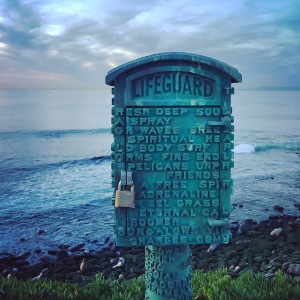 Will there be Coco Pops for breakfast?
Will there be Coco Pops for breakfast?
By Gina Headden
The bus is running late. I drum my feet up and down as, with the rest of the rush-hour traffic, we crawl towards the airport.
Clamped against me in her sling, my two-week-old screams while five-year-old Jack tugs at my sleeve and says something about breakfast.
‘Will they?’ he says.
‘Will they what?’ I say, as between screams the baby tries to suckle on the milk that has broken through my breast pads, creating two dark circles on my jumper at which people stare with zombie-like eyes sunk deep in early-morning faces.
‘Have Coco Pops?’
‘Who?’ I say, licking my pinkie and slipping it into my daughter’s mouth. She closes her lips tight around it for a nanosecond, realises she’s been duped and cranks up the volume of complaint.
‘The café,’ says Jack. ‘At the airport.’
‘Doubt it,’ I say.
Jack looks at me in disbelief.
‘No Coco Pops?’ he says, as the bus stops outside departures.
‘Quick, Jack,’ I say, standing up. Using the buggy as a battering ram, I clear the other passengers from my path and force my way through to the luggage rack.
‘Sorry! Sorry!’ I say, grabbing our case and clambering off the bus.
Jack is nowhere to be seen.
‘Jack!’ I shriek, as a pungent smell reaches my nostrils and a wetness I know isn’t breast milk—unless you count the processed kind—spreads across my belly.
Jack stands in the doorway of the bus, clutching his dinosaur backpack.
‘No Coco Pops?’ he says again, as I grab him by the wrist and drag him from the sea of tutting voices that’s swelling up behind him.
Pushing Jack in the buggy and dragging my fractious four-wheel-drive suitcase behind me, I charge across the forecourt and hurtle through the doorway into departures, my eyes swivelling in their sockets as they search for the bright orange logo of our carrier.
‘Gate’s closed,’ the rep says.
The baby is still screaming and Jack has taken refuge behind his backpack. I smell like a cross between a shit-house and a long-neglected fridge and a brown stain is threatening to merge with the dark circles on my jumper. I look at the composed woman before me, throw my suitcase flat on the floor and sit down on top of it. Taking my baby from the sling, I kiss her pounding fontanelle, pull up my jumper and let her feed. Jack peeps out from behind his dinosaurs and Ms Bright Orange stops telling me I can’t do what I’m doing, lifts her phone and calls security who race towards me from at least three different corners of the foyer.
I explain my situation.
‘Sorry,’ they say, explaining theirs.
And that’s when I start to cry. Not a wailing, weeping, gnashing of teeth type of crying but a choked-back, almost secret sobbing. Jack looks at me, his eyes wide.
‘Come on,’ says one of the security men, helping me to my feet, baby still clinging to my nipple. Another man brings my suitcase and Jack and we walk through the airport to a quiet room where I feed the baby while they try to find us a flight. The man behind the buggy steers Jack to the window, lets him see the runway. They chat and the man bends down, allowing Jack to whisper in his ear.
The man nods and high-fives Jack before approaching me.
‘Would you like a coffee?’ he says.
I want to kiss him but settle for saying please instead.
A few minutes later I’m sipping a flat white and eating croissant, as my sated daughter dozes in my arms and Jack, dear Jack, eyes me in a knowing way and tucks into his Coco Pops.
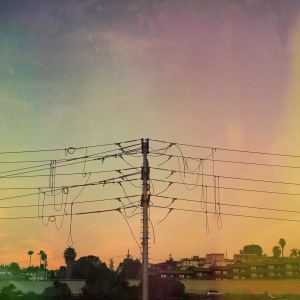 Lily Rose
Lily Rose
By Natalie Evjen
I’m reclined on the bed, my feet in stirrups and legs spread wide, wearing a white-and-blue checkered hospital gown that’s wide enough to fit a cow. One side is drooping off my shoulder, exposing half of my left breast, but I don’t bother trying to fix it. These people I have never met (and hope never to see again in my life) are sticking things in my vagina with facial expressions like they’re stuffing a turkey, so at this point the gown seems more symbolic than functional.
Adam is sitting in a chair next to me, holding my hand. He’s been my constant through it all, patiently waiting out tantrums and listening to my complaints. The decision was mutual, but I wonder what this will do to our relationship. Will it drive us apart? Will we argue about whose fault all this was, what more we could have done to prevent it? I look over at him, his eyes glued to the floor and his face ashen. I want to know what he’s thinking and consider asking, but I’m too afraid of what he’d say.
Other than three missed periods and my pants getting tight, there are no physical manifestations that I’m any different than I was twenty weeks ago. I dodged the morning sickness bullet, haven’t had any unusual cravings or breast soreness, and still don’t understand what people mean when they say it feels like butterflies dancing inside you.
But now it’s getting real. I recently met a girl who went through this last year. She said to be prepared for the guilt, and I’m beginning to understand what she meant. I feel it rising inside me, like an itch in the back of my throat. Was this really the right choice, the best solution? I’ve been collecting the facial expressions of the nurses as they get me ready, and I can’t tell if their eyes are full of pity or condemnation.
The doctor walks in and reads over my chart, then sits down on the stool at the foot of the bed and walks me through the procedure: the tools he’ll use, the risks, how I can expect to feel afterward. I can hardly look at him. Something about his face disgusts me. What sort of man wants to be a gynecologist, anyway? I assume that he must be a creep in real life, then my eyes spot the gold ring on his left hand. I feel sorry for her, whoever she is.
“Are you ready to get started?” he asks.
The question startles me. My chest pounds and the itch in the back of my throat burgeons into a dull throb, because I know that getting started means the door is closing. In a few minutes, this can never be undone or forgotten. Still, I nod.
Adam’s hand tightens like a vise grip, as if he is also feeling the intrusion of the doctor’s cold latex fingers and the sharp poke of the needle. I hold my breath as a nurse hooks me up to machines and monitors, looking at the wall and the ceiling, anywhere I won’t risk catching her eyes. After a few minutes, she asks if there is anything she can do for me. The question seems trite and perversely ironic, but I give her a fake smile and politely shake my head as she walks out the door.
The Pitocin takes longer to kick in than I thought it would. I sit like that for an hour, then two. Everything about the room cements itself in my mind: the cheap watercolor of a beach at sunset, the acrid scent of hospital disinfectant, the scuffed black-and-white floor tiles. Adam and I watch HGTV on the screen bolted into the wall across from the bed. House Hunters is on. We watch a few episodes until we get to one that features a couple that have a five-month-old with curly black hair and dimpled cheeks. I cry and make him turn it off.
The doctor walks in and checks me. He tells me it’s time. Adam holds my hand again and a few nurses gather around.
It only takes four pushes.
The room is garishly silent.
They clean her up for a few minutes. Adam buries his face into my hand. One nurse clasps my forearm and gives me a look of consolation, which unleashes a torrent of sobs that shake my shoulders.
“Do you want to hold her? It’s up to you,” another nurse says.
I nod, not because I want to, but because I know I’ll regret it if I don’t.
They’ve wrapped the few inches of her in a pink blanket. The nurse sets her in my arms. I see now what they saw on the ultrasound two weeks ago: the sunken skull where a brain should have been but for some reason didn’t grow. But mostly I look at her crescent moon eyelids, her mouth that’s shaped like a conversation heart, her pink porcelain nose that looks just like Adam’s.
I can’t take my eyes off her. Adam leans beside me, tears dripping from his cheeks onto my chest. He’s whispering ‘I love you’ over and over again, and I know it’s meant for both of us. And suddenly, in a way that I’ll never be able to explain or fully understand, she pardons me.
We name her Lily Rose.
 Like Toy Soldiers
Like Toy Soldiers
By Paul Gray
“885, 886—887!”
The four boys counted the miniature soldiers carefully, dropping them into their satchels one by one. These figurines were doubly valuable. As well as comprising a hell of a collection they also represented their gun-toting heroes—nay, Gods—of the war-crazed Granite Planet (now safely extinct, thank God) they called home.
Satisfied, they slung the bulging bags across their shoulders and leaving parents Coll-in and Bett-ee gawping dismally from the picnic blanket began their cheerful traverse of the island.
They were, as brothers go, at that stage in which bland similarities give way to yet blander individualities. But they both liked the same pursuits—and this one above all.
Every few steps there would come a pause, the plonking down of an inch-high figure onto the grassy sward, a marking of its position, and a carrying on. In this fashion they returned to the beach off which the second-hand Star-Mobile bobbed gently at anchor.
This vehicle—“The Old Pie-can” as father affectionately termed it—had rattled them precariously across the void to this anonymous ping-pong ball of a water-world, had conveyed them right round it, and eventually onto it. The boys had enjoyed the jungles, splashing ankle-deep through the rivers, with the tips of the tree-things tickling naughtily inside the bottoms of their short trousers, and although there was no evidence anywhere of two-legged creatures like themselves, there WERE animals—albeit titchy ones. They had picked them up. Some had trunks, others horns, whilst a third variety boasted vastly elongated necks. Alas, their attempts to pocket a few specimens had been pretty strongly vetoed by the folks, who had other things to worry about, never mind pets!
They worked their way back up the rocky slope, fanning out, strewing the figurines, passing the parents who—surprise, surprise—had reverted to their default position: advanced bickering. The father was spluttering shell from the hard-boiled Frumple-Chick egg he’d popped into his flabby maw, whole. An armoured-bus driver, he was far too idle and incurious to go about peeling things. From their grumpy exchanges the boys easily deduced the subject under discussion to be the state of crisis back home. They didn’t really understand, but apparently it had to do with the sun, which had gone … funny.
Thus mother’s already heavy neurosis had skyrocketed. And so father—if only for peace—had suggested this jaunt, this getaway. Their flight through the stars and subsequent splash-down onto this triangular pocket-handkerchief of rock-strewn veldt (surrounded by the blue/green watery stuff on the tiny planet) had taken place right after the fear-ridden bulletin of two nights ago.
Their satchels empty, the boys produced laser pistols and dashed around taking pot-shots at the figures they’d strewn all over the terrain. “Pow! Pow! Ka-Pow!” they bawled (notwithstanding the parents’ irritation).
This was it! This was living! Here was the grand future as they envisaged it—one of endless shooting, a la the pro-gamesters with their characteristic flat heads and ski-noses as depicted in the figurines.
Such a taste for violence must be acquired rather than inherent, and indeed it was the result of a war-culture so rabid that those who fought in the endless succession of conflicts—the soldiers—doubled as superheroes, appearing on specially-created TV shows such as I’m a Celebrity—kill me!, and The Great Celebrity Knock-Off.
Fortunately Reality Shows would never vault the time/space continuum and set up on other worlds, in other times.
“Aaaaarghh!”
The boys swung round in dismay at the sudden ejaculation. Had a ricochet caught mother? But no. Both parents had shot up erect, transfixed and gurgling, their eyes heavenward. NOW they saw it! Far far beyond the little spit-ball of an orb that lighted this world, a miniscule red pulse flickered steadily on, off, on, off. Uneasy looks passed between them.
“Oh my Gawd,” groaned father, egg-shell cascading. “It’s ’appened!” There came a flurry of frantic parental activity. The stupefied lads were seized and borne forwards, heavily gripped about the podgy bits. “But, Dad!” shrilled the eldest. “Our soldiers!”
“ B ——- yer sowjers!” bawled the father. And then, more gently, “You’ll ’ave to start new collections—back ’ome! WE’ll ’elp yer!”
“What ’ome?!” his wife shrieked. “It’s gone, yer stupid fat git!”
“Shaddap, yer silly mare!”
In this charming fashion, they clattered down to the beach for the return journey to a world that had already ceased to exist.
Eighteen centuries after the death of the exemplary prophet Jesus, a suavely-dressed man lingered on the green and hilly terrain of the island on which his boots were, in his opinion, the first to step. For some time he had been engrossed in his study of the great rock obelisk that towered before him: a lowering humanoid figure, low-browed, ski-nosed, and lurching somewhat.
He glanced up as a smaller, scruffier man appeared over the horizon and sprinted panting to his side. “887!” the newcomer reported, thinking: It wouldn’t do YOU any harm to perform a spot of legwork now and again, matey. “Dotted all over the island. Some are quite erect, others leaning at angles. Any opinions?”
The suave man, Jacob* by name, shrugged. “Gods,” he opined. “It’s always Gods with these primitives, isn’t it? Now I wonder how tall it might be …”
The other sighed. “I suppose you want me to—”
“Mmm.”
Don’t bother saying “please” or anything, the other thought, and bent to lash up his clambering boots. Upon straightening he was surprised to find the other proffering something. “Season’s greetings, Bram!” he cried. “And do cheer up!” He gestured lavishly about. “All this is great news for the Netherlands—and for us!”
“A chocolate egg! I take it all back!”
“Hmmm?”
“Oh … nothing, but—I say! That gives me an idea for the perfect name for this place. Egg Island!”
He flexed his shoulders and began his grappling ascent. Jacob smiled knowingly.
“Close,” he said.
*Editor’s Note: The first-recorded European contact with Easter Island took place on Easter Sunday 1722 when Dutch navigator Jacob Roggeveen visited for a week.
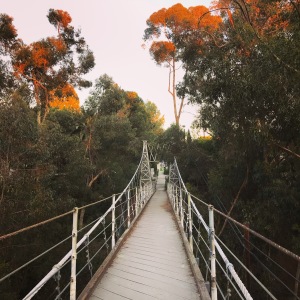 Ending
Ending
By Gwenda Major
Come to think of it, I should have realised when I didn’t spot him at the party. I didn’t think anything of it at the time, because they’re really weird occasions anyway—farewell parties, on a huge scale. You can always tell the ones who’ve been selected. They’ve got a sort of dazed look. Even though it can’t have come as a surprise to them. Once you’ve passed fifty it could be any time. But nobody’s ever really ready are they? I’m pretty sure I won’t be when it’s my turn.
I’d met up with Evan for a drink a few weeks before. I knew he’d just had the alert so I thought he seemed surprisingly cheerful.
“Look mate, it’s the same for everybody,” he said as he downed his second pint. “That’s why it’s fair. No ‘us’ and ‘them’. Doesn’t matter how rich you are. When your number’s up, that’s it. The old lottery of life. After all, we all voted for it, didn’t we?”
I laughed uncomfortably. “That’s true, I suppose—at least that’s what they said. But seriously, though—how does it feel?” Then I backtracked. “That is, if you don’t mind talking about it?”
“Nah, it’s fine. I won’t deny it was a bit of a shock when the alert came: ‘Your continuation number has come up in the annual draw. Please put your affairs in order and attend your nearest end-centre on June 20th.’ ”
“Three months warning. That’s not a lot, is it?” I tried and failed to imagine how I’d react when it happens to me. I’m forty-seven so I’ve got a few years yet, but after that it’s just a matter of time. You might get safely through a few draws but nobody to my knowledge ever reaches sixty these days. “How has Carol taken it?”
“Oh you know. She was upset for a while but I think she’s come to terms with it. There’s no point fighting it, is there? Not since the referendum. The will of the people and all that.” Evan leant back in his chair and smiled. “You have to hand it to them. It was a stroke of genius, wasn’t it?”
“What?”
“The way they solved the crisis. Too many elderly people. Not enough carers. Too few hospital beds. Health service on the verge of collapse.” Evan looked almost triumphant, almost as if he’d thought of the solution himself.
“And now,” I chimed in. “No old age. No geriatric care. No loneliness. Just an annual draw and a quick trip to the end-centre.”
“The same for everybody—fair and equal. Efficient and painless. After all, people had been banging on for years about the right to die, and now they’ve got it.”
“Just not the right not to die,” I couldn’t resist adding.
“Always the cynic, eh Ben?” Evan clapped me on the back. “One for the road?”
When I got home that night I remember saying to Debbie that it was reassuring that Evan was taking it so well. Three months to his ending and he was remarkably sanguine about it. Debbie’s never liked Evan for some reason. Thinks he looks down on us. But then she didn’t know him as a kid. We were good mates despite the difference in ages. Really close. I think I can say I know him better than most. He might be rich and move in powerful circles now, but he’s still Evan, the pimply kid, always up to some devilment but never getting caught.
So naturally when I saw him in July at the airport it was a shock. I knew his ending had been scheduled for June 20th because the lists are made public, but there he was, as large as life, queuing at the Executive check-in for a flight to the Bahamas. Our eyes met and he turned away quickly but I knew it was him.
 Different
Different
By Vanessa Anyanso
So after all this time, we finally meet.
It’s been a long time coming, hasn’t it? We always get quite close, but this—this is the first time you’ve managed to follow through. Honestly, I had come to the conclusion that you were merely flirting with me, taunting and teasing without any meaningful intention to commit. To be fair, you have been quite unreliable since the beginning of our courtship and have always canceled our dates last minute. But I still had hope that we would finally meet, until your actions last fall proved otherwise.
You remember it, don’t you?
November 9th.
We had planned months ahead of time. Well, technically, you did the planning. Finding room in my schedule wasn’t an issue for me, but you had to choose the “perfect” date. It took a few days to come to an agreement, but you eventually settled on the ninth of November. You actually wanted to meet me earlier—that evening in fact—but you decided to hold off because it wouldn’t have been fair to your little sister to leave so suddenly mere days before her birthday. And then it would be too close to Halloween and you couldn’t do that to your other siblings, and if you waited too long it would be Thanksgiving, and soon after that, Christmas. So you chose November 9th as the perfect date.
About a week cushion after Halloween as to not spoil the holiday, and two weeks to give your family time to recover before Thanksgiving. You were aware that the fairest thing to do would be to wait until after all the holidays had passed, but you couldn’t. You were pining to finally meet me and I couldn’t refuse you. November 9th was a compromise between your longings and what was best for your family.
But all the planning was for naught, for you canceled when I was but a few minutes away. You screamed at me. Begged me to go away. Said it was a mistake. Cried. Found strength deep in your soul you weren’t aware of having and fought me off. Pushed me away.
So I left. Convinced that it would be many decades until we met.
But yet, here you are.
Unannounced.
I wonder.
Why don’t you call for help this time?
Why don’t you stop the bleeding?
What makes this time different?
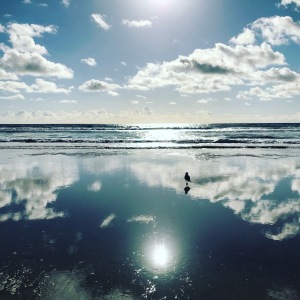 HOST
HOST
By Arya F. Jenkins
She stares at the assortment of plates before her—home-made hummus, black and green pitted olives, warmed pita bread triangles, grape leaves, brie, crackers. Enough for a party. He’s in the kitchen stirring up sauce for pasta, the main course.
How will she get through it? He’s whistling, and she’s counting to herself, a calming practice. Through the open portal between the living room and kitchen, she can see him bustling before the stove in a spanking clean apron, anxious to please her.
On a table directly before the glass one on which sits all the food are photos of Sarah. Young Sarah in black and white. Sarah, post divorce, when her daughters were girls, before Lou. Then with Lou at a church community center, sitting close, both wearing pinched expressions—guilt? Or anxiety? Then photos of Sarah alone, hair shorn, then wearing a turban. Sarah perched on the piano top, Sarah everywhere.
How is it? You need anything? Napkins! He runs out and returns with a handful as if there are a dozen guests, not just her.
I’m fine. It’s all splendid.
Comfortable?
Yes, very.
I think I’ll get comfortable too. Do you mind?
Of course not, she says, wondering, how comfortable can he get? Is he going to come out wearing a silk nightie, one of hers? She laughs uncomfortably at her own thought.
She knows Lou likes her, always has, even before Sarah’s cancer, when they were just ordinary concerned citizens in their 20s protesting on street corners in support of troop withdrawal from Iraq, then for Gaza. She had not met Bill yet, or miscarried their child, or failed to recover their marriage.
She was drawn by Lou’s loyalty to Sarah, who was so much older after all, and his passion for causes, and his protectiveness of women in their activist group when right-wing crazies drove by hurling epithets, go home, losers! or worse, tossed empty plastic bottles, and once, tomatoes, as if at performers. Lou thought nothing of running after them, furious; he was a fearless combatant.
Sarah was a retired lawyer. Lou, a one-time college drop out with ADD and a dozen jobs under his belt. But you could ask him anything—about the history of the Palestinian and Israeli conflict, remote tenets of Judaism, the history of the Democratic Party—and he could expound. A passionate speaker, he could hold a room in thrall. But his rashness, impetuousness, even with authorities, has gotten him arrested at demonstrations.
She suspects he knows she’s attracted to his wildness. What woman would not be?—even if there is no more than that. After all these years, she thinks of him as she did of Sarah, as second family.
He emerges from the hallway, barefoot, clad in a white tee and thin plaid pajama pants pulled high over his tight paunch.
This is how I like hanging out before bed.
She winces, nodding. What can she say? Sarah has been gone a month and here he is, offering himself to her.
I have to tell you, I’ve thought about you a long time, years.
It’s too late to stop him and she can feel herself prickle and blanch. Please don’t, she thinks. But he’s on a mission.
I have to unburden myself. He spreads his broad palms in her direction, plopping down next to her, the backs of his hands resting on her knees, which she draws up before her instinctively. She can see the pot of pasta boiling just away and alerts him.
He rushes toward it. There is metal clatter, the sound of running water, plates. Her eyes close in a kind of prayer—please don’t.
He returns swiftly to renew his outpour, tells her he loves her, always has, and will she marry him.
Unable to speak, she turns away. It’s all crazy grief. Imagine moving into Sarah’s house, where her room is still intact, the pillow on which she passed away, its pillowcase and sheets untouched, her things all in the closet. The bathroom, cluttered with her makeup—all the things he cannot bear to toss.
She wants to remind him of this, but instead plucks up and savors an olive, then applies a sliver of brie to a pita slice, which she takes in a couple of bites. There is no other way to let him know than this.
Thanks so much. She stands. I’m flattered. Really. But I have to go.
She can feel her throat, chest and stomach constrict, her entire body being squeezed. What he proposed is what every woman supposedly wants to hear, well, supposedly every woman. His eyes grow wide. No, you can’t go. We haven’t had dinner. I’ve offended you.
No, no, she lies, applying a gentle palm on his chest like a stop. You haven’t. I should just go. I’m flattered, really. Friends, we’re friends. I’m that woman in your life who becomes your best buddy until you find the right one. Really. You might not think so now. But yes, as she flees out the kitchen door.
As she gets into her car, he calls out to her, his apron staining white the doorway, a wooden spoon in one hand. But you’re the one. I thought you felt it too.
She waves at him, nodding like it’s OK, of course it is, wondering if he can see her in the dark as she backs out the drive, and when she is on the street, makes an effort not to speed up while counting to herself slowly.
 Memento Mori
Memento Mori
Dara Thomas Higgins
On the day I have chosen to leave I awake at the usual time to the sound of my alarm clock a ring ding dinging on its mantle next to my bed. I lie there a while, until the thin rectangle of sunlight that finds its way through the crack in the curtains and across the room finally finds my face. Then I get up, fill the basin with cold water, and submerge my face into it.
I spent the night before packing. There’s not much to pack but I still deliberated, unpacked, repacked and then packed again. The suitcase now holds my good suit, my good shoes, my good shirt, some spare underwear and my spare jeans, plus some old T-shirts once emblazoned with decals across the chest that have now faded through wear and wash. I forget what they once said. My memory isn’t what it once was. I think. My memory isn’t what it once was.
I make a pot of coffee, and finish what’s left of the bread. The remainder of the milk gets poured down the sink, staining the sides white until the gurgling tap chases it down the plug hole. The coffee tin I put in the kitbag, along with some books to read, some other artefacts I would not like to leave behind. I look around me, at the kitchen. The cupboards are now bare but for old, cracked plates, some cups, some pots that haven’t held food for what may be years now. Impotent implements, had they will, they’d be doing what I am, but they can’t, they are in thrall to the inertia of this place. I am not.
I’m dressed for comfort as the journey may take several hours, and the roads may be rough. I don’t know, having never before taken the bus, but I know it well enough as it stops by the line of shops across from Terry’s bar where my credit is sometimes still good. But before I take my leave I pry up the loose floorboard by the pantry and remove Mama’s teabox. It’s where Mama hid her money, and I’ve known all along, despite her best intentions, and quite thankfully too, considering in the dementia there at the end, she forgot to tell me. But I never took from it, not once, even in times of penury, or even times when I’ve needed to be drunk a sizeable portion of the day. I know she saved it for me to start anew after she was gone.
I leave, and lock the door, and now, with my suitcase in one hand, and my kitbag slung over my shoulder, I head towards town. The sun is high and yellow now, and the shadows of buildings are pooled around, like ink.
Knowing the bus leaves at 3.37, precisely, having witnessed the event many times while sat across the way in Terry’s Bar, I can take my time on my wander into town. A slow, sultry stride takes me past my erstwhile neighbours, sitting out in the sun, or trimming the edge of a threadbare lawn, broodless old ladies beating carpets, children cat-calling in a game of football. Some nod at me, or make near imperceptible gestures of acknowledgment, raising a gnarled nicotined finger perhaps, and I return with like. A nod of the head, lifting a finger to the edge of my bill. None call out to me, none enquire as to the nature of business, walking, as I am, emburdened by luggage.
I get to the shops at one of the clock. Despite my languid gait, I’ve hardly killed fifteen minutes. With hours to spare I buy a one-way ticket from old Fred, sat behind the counter, all jolly and fat and reeking slightly, a cake of spittle around his lips, churning up ever more as he speaks.
-And where ye off to?
Where? I say, -Do I have a choice?
-Bus only go one way, says Fred.
-Oh yeah, I say back. -Which way is that?
-Left, he says, and churns up another gobful of froth laughing hearty to himself.
I take myself across the road. There’s no one on the street, not in this sun, not at this time. Terry is in there, in his dark bar, leaning down, reading the paper.
-Hours to kill, I tell him.
-Yuh? He says, and takes down a glass, which catches the edge of some sunlight that creeps in those windows he never washes. -You got some money to kill it with?
-I may just do, I say, and rest my bags on his dusty floor.
-Goin somewhere?
-You betchya.
-Yuh? Where’s that?
-Anywheres but here, my friend. Anywheres but here.
-Well, in that case, he says, and turns to take down from the shelf the good sipping whisky, -in that case …
-Well in that case, I say, -you better fill her.
And he does.
Sun slinks in through those dirty windows, slides across the floor, nuzzling around my ankles like a faithful hound, crawling slowly up my leg like a lascivious bitch, wanting something from me. I can see spots happening in my eyes. It’s too hot out there today. And I’m flush, and cool in here.
-Fill her up, fill her up, I say. -I’m getting out of here today.
The clock ticks lugubriously on.